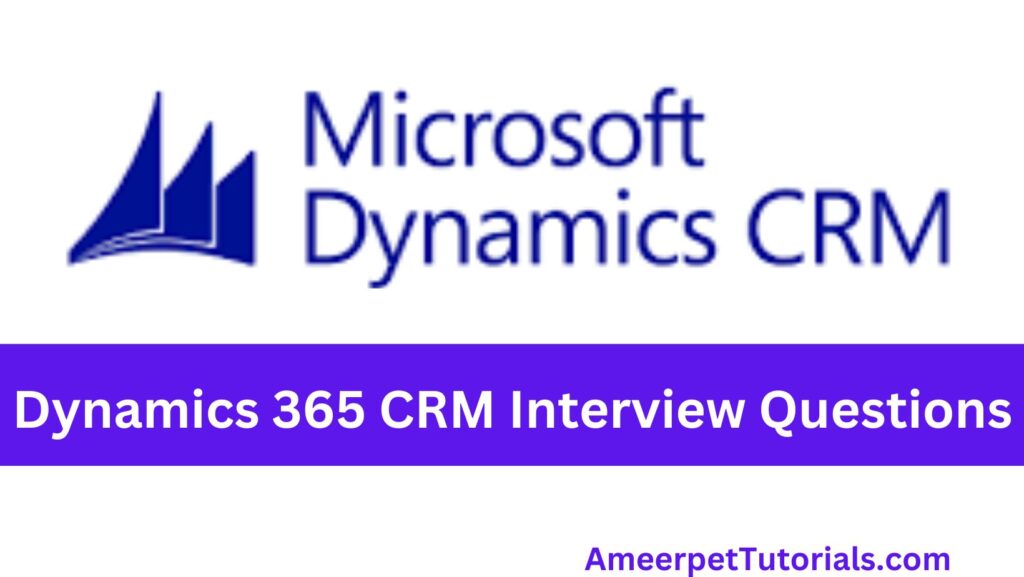Microsoft Dynamics CRM Interview Questions: Your Ultimate Guide
Are you getting ready for a Microsoft Dynamics CRM interview? Whether you’re an experienced professional or just beginning your journey, having a solid grasp of the platform is crucial. This blog post covers 30 essential interview questions that will help you excel in your interview. We’ve also included real-world scenarios and code examples to ensure you’re thoroughly prepared.
1. What is Microsoft Dynamics CRM?
- Answer: Microsoft Dynamics CRM is customer relationship management software developed by Microsoft. It focuses on improving customer relationships for businesses by offering tools for sales, customer service, marketing, and field services.
2. What are the key components of Dynamics CRM?
- Answer: Dynamics CRM consists of several main components:
- Sales: Manages the sales process and tracks customer interactions.
- Customer Service: Helps resolve customer service cases effectively.
- Marketing: Manages marketing campaigns and tracks leads.
- Field Service: Manages work orders and schedules resources.
3. Can you explain the concept of entities in Dynamics CRM?
- Answer: Entities are the core data structures in Dynamics CRM, similar to database tables. Each entity represents a set of records, like contacts, leads, or opportunities.
4. What is a workflow in Dynamics CRM?
- Answer: A workflow automates processes that trigger based on specific conditions, such as creating or updating a record. Workflows help streamline business operations.
- Example: Automatically sending an email to a customer when a new case is created.
5. How do you customize entities in Dynamics CRM?
- Answer: You can customize entities by adding fields, modifying forms, and creating relationships. These customizations are made through the Dynamics CRM interface or by using the SDK.
6. What is a plugin in Dynamics CRM?
- Answer: A plugin is custom code that runs in response to specific events within Dynamics CRM, such as creating or updating a record. Plugins are written in C# or VB.NET.
- Real-World Scenario: If you need to automatically update the total value of an opportunity when a product is added, a plugin can handle this.
7. What types of relationships exist in Dynamics CRM?
- Answer: Dynamics CRM supports three types of relationships:
- 1:N (One-to-Many): One record of an entity relates to many records of another entity.
- N:1 (Many-to-One): Many records of an entity relate to one record of another entity.
- N:N (Many-to-Many): Many records of one entity can relate to many records of another entity.
8. How are business rules used in Dynamics CRM?
- Answer: Business rules allow you to apply logic without coding. For example, they can show or hide fields, enable or disable fields, and validate data. Business rules run client-side on forms.
- Example: You can hide the discount field automatically if the total amount is less than $100.
9. What is a solution in Dynamics CRM?
- Answer: A solution is a container for all your customizations, including entities, workflows, and plugins. You can export and import solutions across different environments.
10. How does Dynamics CRM integrate with other Microsoft products?
- Answer: Dynamics CRM integrates seamlessly with Microsoft products like Office 365, Power BI, and Azure. This integration boosts productivity and enhances data analysis capabilities.
11. What is a form in Dynamics CRM, and how do you customize it?
- Answer: A form is the user interface where users interact with data in Dynamics CRM. You can customize forms by rearranging fields, adding sections and tabs, and applying business rules.
12. What are fields in Dynamics CRM?
- Answer: Fields, also known as attributes, are individual data points within an entity. Fields hold data such as text, numbers, dates, or lookups.
13. What role do dashboards play in Dynamics CRM?
- Answer: Dashboards provide a visual overview of data through charts, lists, and other components. They help users monitor performance and key metrics in real-time.
- Example: A sales dashboard can display total sales, open opportunities, and leads by source.
14. How do you create a custom report in Dynamics CRM?
- Answer: You can create custom reports using tools like SSRS (SQL Server Reporting Services) or the built-in Report Wizard. Reports can be based on entities, and you can apply filters.
15. What is a business process flow in Dynamics CRM?
- Answer: A business process flow guides users through a business process in a defined sequence. It ensures consistency and helps users complete tasks efficiently.
- Real-World Scenario: A sales rep can use a business process flow to navigate through the stages of a sales cycle, from lead qualification to closing the deal.
16. How can you perform data migration in Dynamics CRM?
- Answer: You can migrate data using tools like the Data Import Wizard, SSIS (SQL Server Integration Services), or third-party tools like Scribe.
17. What is the difference between managed and unmanaged solutions?
- Answer:
- Managed Solution: A managed solution is locked, so you can’t edit customizations after import.
- Unmanaged Solution: An unmanaged solution is open, allowing you to edit customizations after import.
18. How do you configure security roles in Dynamics CRM?
- Answer: Security roles control what users can see and do within Dynamics CRM. You can configure roles by assigning privileges to entities and records.
- Example: A salesperson might have access to their leads but not to those of other salespeople.
19. What is a queue in Dynamics CRM?
- Answer: Queues help manage and prioritize work items like cases or activities. They assist in distributing workloads among team members.
20. How does Dynamics CRM support multi-language and multi-currency?
- Answer: Dynamics CRM supports multiple languages and currencies out-of-the-box, enabling organizations to operate globally with localized content.
21. Why is the Common Data Service (CDS) important?
- Answer: The Common Data Service is a data platform that stores and manages data used by business applications. It underpins Dynamics 365 and the Power Platform.
22. How do you use Power Automate with Dynamics CRM?
- Answer: Power Automate, previously known as Microsoft Flow, automates workflows between Dynamics CRM and other applications. For example, you can set it to send notifications when a new lead is created.
- Example: Automatically creating a task in Dynamics CRM when a new email arrives in Outlook.
23. What are the main differences between Dynamics 365 Sales and Dynamics 365 Customer Service?
- Answer:
- Sales: Focuses on managing the sales pipeline, opportunities, and customer relationships.
- Customer Service: Focuses on managing cases, customer issues, and service level agreements (SLAs).
24. How do you handle duplicate detection in Dynamics CRM?
- Answer: Duplicate detection rules identify and manage duplicate records in the system. You can create rules to match fields like email addresses or phone numbers.
25. What is a virtual entity in Dynamics CRM?
- Answer: A virtual entity allows you to integrate and display data from external systems in Dynamics CRM without storing it in the CRM database.
- Real-World Scenario: You might display customer order data from an external ERP system within Dynamics CRM.
26. How can you optimize the performance of Dynamics CRM?
- Answer: You can optimize performance by following best practices like optimizing queries, minimizing plugins, and using efficient data structures.
27. What role does JavaScript play in Dynamics CRM?
- Answer: JavaScript enhances user experience by adding custom behaviors, validations, and interactions on forms within Dynamics CRM.
- Example: Disabling a field based on the value of another field can be achieved with JavaScript.
28. What are the key features of Dynamics 365 AI?
- Answer: Dynamics 365 AI leverages machine learning to provide intelligent insights, predict outcomes, automate processes, and improve decision-making.
29. How do you manage data privacy and GDPR compliance in Dynamics CRM?
- Answer: You can manage data privacy and GDPR compliance by using tools like data masking, audit logs, and data retention policies within Dynamics CRM.
30. What is the future of Dynamics CRM in the cloud era?
- Answer: Dynamics CRM, now part of Dynamics 365, continues to evolve with a strong focus on cloud-based solutions and AI integration. This evolution ensures that Dynamics CRM remains a critical tool for businesses globally.

